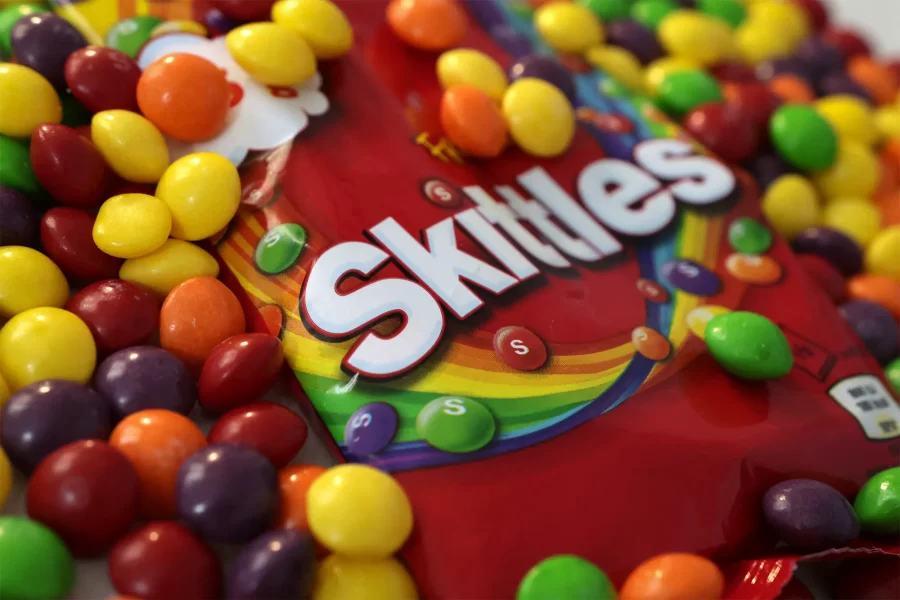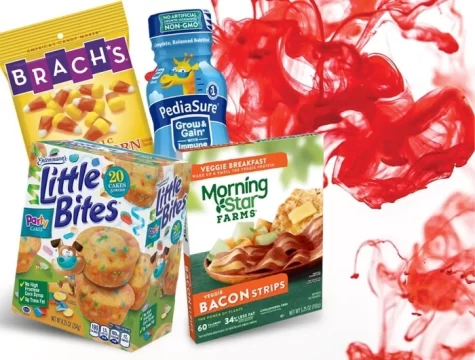
Sophia Yeskulsky| Writer
October 19, 2023
As of October 7th, 2023, California Governor Gavin Newsom passed Assembly Bill (AB) 418 that aimed to ban the dangerous and toxic chemicals in America’s food supply. The governor made history, as this was the nation’s first law banning four “toxic” chemical food additives found in popular drinks, baked goods, and candy.
How did this California Food Safety Act become known as the “Skittles Ban”? The four ingredients that are now banned in the sale of processed foods in California are brominated vegetable oil, potassium bromate, propylparaben, and red dye No. 3. An earlier version of the California legislation included titanium dioxide, an additive used in Skittles to help make them shine and give them their vibrant colors. The ban on this additive would have changed the original Skittle that we have all come to love and know or restricted the sale of Skittles in California. The coloring agent can also be found in M&Ms and various dairy products such as Kraft fat-free shredded cheddar cheese. Luckily, titanium dioxide was removed from the bill in September; however, the misleading name has stuck ever since.
As for the 4 additives that were actually banned, they are used in as many as 12,000 popular food products across the country. Most notably, Peeps; Pez; Fruit By the Foot; Hostess products; Brach’s Candy Corn; and the Yoo-hoo Strawberry Drink. By far, the banning of red dye No. 3 is going to have the biggest effect. The dye has been allowed in food since 1907 — however, it was banned in cosmetics in 1990 after the F.D.A. cited an industry-conducted study that found that the chemical caused thyroid cancer in male rats. Furthermore, a report in 2021 from the California Environmental Protection Agency linked the chemical to hyperactivity and other neurobiological behaviors in some children.

Additionally, some bagels, bread, crackers, doughnuts, English muffins, pastries, pizza dough/crust, pretzels, rolls, tortillas, and waffle cones contain potassium bromate. This will have a huge impact on the baked goods industry as well.
Even though the bill was put into place to protect the well-being of California citizens, large corporations have spoken up about their opposition to this ground-breaking law. The National Confectioners Association, an American trade organization that promotes chocolate, candy, gum, and mints, and the companies that make these treats released the following statement: “California is once again making decisions based on soundbites rather than science. Governor Newsom’s approval of this bill will undermine consumer confidence and create confusion around food safety. This law replaces a uniform national food safety system with a patchwork of inconsistent state requirements created by legislative fiat that will increase food costs.”
Junior Ashely Stafford, a Skittle lover, believed that “the law is good for the safety and health of Americans” but she still doesn’t “want to lose all of [her] favorite sweet treats.” Contrary, hunior Mia Lewis believes that the ban “is a necessary step forward.” The Triton emphasized the importance of having “cleaner and safer foods that aid the growth and development” of humans.
Governor Newsom has set a deadline of January 1, 2027, for all food manufacturers to reformulate their products to meet the requirements for selling in California.

Leave a Reply